|
|
|
Sort Order |
|
|
|
Items / Page
|
|
|
|
|
|
|
| Srl | Item |
| 1 |
ID:
094561
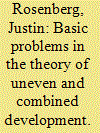

|
|
|
|
|
| Publication |
2010.
|
| Summary/Abstract |
Where does 'the international' come from? What accounts for its existence as a dimension of the human world? This article attempts an answer, in three steps, using the idea of 'uneven and combined development' (U&CD). First, a depth model is constructed, comparing different ways of linking uneven development with international relations. Thus far, it turns out, these ways have all presupposed the fact of political multiplicity, rather than explaining it. In search of explanation, the article turns, secondly, to the compelling historical sociological argument of Barry Buzan and Richard Little. This locates the origins of geopolitics in the late prehistoric shift from hunter-gatherer to settled agricultural existence, together with associated processes of social differentiation and proto-state formation. Buzan and Little's explanation appears at first to pre-empt the need for the concept of U&CD. Yet closer inspection reveals that unevenness and combination play a key role in their empirical account without, however, being theorized. The third step of the argument therefore seeks to show how these are necessary parts of the process of social change which Buzan and Little describe. And in this way it emerges that the origins of 'the international' do indeed lie in the uneven and combined character of historical development.
|
|
|
|
|
|
|
|
|
|
|
|
|
|
|
|
| 2 |
ID:
184131
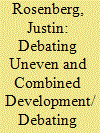

|
|
|
|
|
| Summary/Abstract |
This forum arises from an online event on the theory of uneven and combined development (UCD). Following an introduction which proposes a ‘special affinity’ between UCD and International Relations (IR), four presenters at that event discuss their ‘view from outside’ UCD, including perspectives from Global Historical Sociology, Realism, Decolonial theory and Gramscian Marxism. Meanwhile four members of the audience add their views on UCD and disciplinarity, the need for pluralism in UCD methodology, UCD and ‘whiteness’, and its potential contribution to ecological theory and practice.
|
|
|
|
|
|
|
|
|
|
|
|
|
|
|
|
| 3 |
ID:
152341
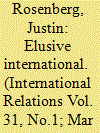

|
|
|
|
|
| Summary/Abstract |
This piece responds to the critical commentaries offered in this forum. I re-state the core aspects of the thesis and emphasize four themes related to theory in response to the critics: (1) Levels of Theory, (2) Locations of Theory, (3) Disciplines of Theory and (4) Ideologies of Theory.
|
|
|
|
|
|
|
|
|
|
|
|
|
|
|
|
| 4 |
ID:
061565
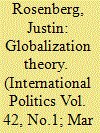

|
|
|
|
|
| Publication |
2005.
|
| Summary/Abstract |
'Globalization' was the Zeitgeist of the 1990s. In the social sciences, it gave rise to the claim that deepening interconnectedness was fundamentally transforming the nature of human society, and was replacing the sovereign state system with a multi-layered, multilateral system of 'global governance'. A decade later, however, these expectations appear already falsified by the course of world affairs. The idea of 'globalization' no longer captures the 'spirit of the times': the 'age of globalization' is unexpectedly over. Why has this happened? This article argues that 'Globalization Theory' always suffered from basic flaws: as a general social theory; as a historical sociological argument about the nature of modern international relations; and as a guide to the interpretation of empirical events. However, it also offers an alternative, 'conjunctural analysis' of the 1990s, in order both to explain the rise and fall of 'globalization' itself, and to illustrate the enduring potential for International Relations of those classical approaches which Globalization Theory had sought to displace
|
|
|
|
|
|
|
|
|
|
|
|
|
|
|
|
| 5 |
ID:
077897
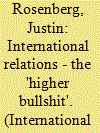

|
|
|
|
|
| Publication |
2007.
|
| Summary/Abstract |
This article replies to an earlier forum (International Politics (42.3) on 'Globalization Theory: a Post Mortem'. Whereas the 'Post Mortem' had criticized Globalization Theory largely for its neglect of Classical Social Theory's achievements, the current paper emphasizes its reproduction of one of Classical Social Theory's greatest limitations: the failure to incorporate 'the international' into its theorization of historical development. This limitation, it is argued, may be overcome using the idea of 'uneven and combined development', an idea which is first reformulated (in order to re-connect the premises of social and international theory), and then used as a vantage point from which to respond to criticisms of the 'Post Mortem'. 'The international', it turns out, is not the fading reality postulated by Globalization Theory but rather a fundamental dimension of social existence that IR, uniquely among the social sciences, encounters as its core subject matter
|
|
|
|
|
|
|
|
|
|
|
|
|
|
|
|
| 6 |
ID:
146002
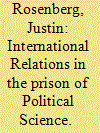

|
|
|
|
|
| Summary/Abstract |
In recent decades, the discipline of International Relations (IR) has experienced both dramatic institutional growth and unprecedented intellectual enrichment. And yet, unlike neighbouring disciplines such as Geography, Sociology, History and Comparative Literature, it has still not generated any ‘big ideas’ that have impacted across the human sciences. Why is this? And what can be done about it? This article provides an answer in three steps. First, it traces the problem to IR’s enduring definition as a subfield of Political Science. Second, it argues that IR should be re-grounded in its own disciplinary problematique: the consequences of (societal) multiplicity. And finally, it shows how this re-grounding unlocks the transdisciplinary potential of IR. Specifically, ‘uneven and combined development’ provides an example of an IR ‘big idea’ that could travel to other disciplines: for by operationalizing the consequences of multiplicity, it reveals the causal and constitutive significance of ‘the international’ for the social world as a whole.
|
|
|
|
|
|
|
|
|
|
|
|
|
|
|
|
| 7 |
ID:
188695
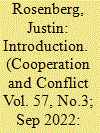

|
|
|
|
|
| Summary/Abstract |
This text introduces the Special Issue on Multiplicity. It sets out the broad research programme of Multiplicity, considers some criticisms that have been made of this programme and then summarises the contributions to the Special Issue.
|
|
|
|
|
|
|
|
|
|
|
|
|
|
|
|
| 8 |
ID:
179042
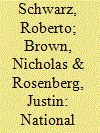

|
|
|
| 9 |
ID:
120474
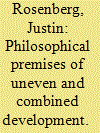

|
|
|
|
|
| Publication |
2013.
|
| Summary/Abstract |
Recent debates over Leon Trotsky's idea of 'uneven and combined development' (U&CD) have focused on its potential in the field of International Relations, but they have not established the source of this potential. Does it derive from the philosophical premises of dialectics? The present article argues that the idea of U&CD in fact involves an innovation as fundamental for Marxist dialectics as for other branches of social theory. And it also argues that in formulating this innovation, Trotsky provided a general solution to some of the most basic problems in social and international thought. The argument is set out in three parts. The first part reconstructs Trotsky's own account of dialectical premises and their implications for social explanation. The second shows how the concept of U&CD departs from this, in ways that presuppose the tacit addition of a further ontological premise. Finally, part three analyses the locus classicus of the concept - the opening chapter of Trotsky's History of the Russian Revolution - showing how it is this additional premise which underpins the central achievement of the idea: its incorporation of 'the international' into a theory of history.
|
|
|
|
|
|
|
|
|
|
|
|
|
|
|
|
| 10 |
ID:
179039
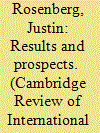

|
|
|
|
|
| Summary/Abstract |
This paper introduces the Special Issue on Uneven and Combined Development (UCD). It begins by briefly outlining the idea of UCD and reviewing its history – from its origins in the writings of Leon Trotsky to its contemporary renaissance in the field of international studies. A second section then introduces the contributions to this Special Issue, showing how they amount to a powerful new wave of UCD studies.
|
|
|
|
|
|
|
|
|
|
|
|
|
|
|
|
| 11 |
ID:
179047
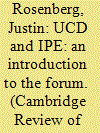

|
|
|
|
|
| Summary/Abstract |
What is the significance of UCD for the field of International Political Economy? In 2019, Justin Rosenberg and Chris Boyle argued that Trotsky’s idea provided an understanding of capitalist world development that helped explain the 2016 Brexit vote and the election of Donald Trump (Rosenberg and Boyle 2019). Situating these events in the longue durée, they interpreted them as outcomes of a unique historical conjuncture of uneven and combined development: neoliberal deregulation in the West had intersected with late-late industrialisation in China; this ‘simultaneity of the non-simultaneous’ multiplied the ‘big country’ effects of China’s industrialisation at a point of maximum openness in the newly deregulated international economy; this produced a major ‘trade shock’ that hastened the decline of manufacturing employment in Britain and the United States, in a geographical pattern that matched the distribution of the Leave and Trump votes.
|
|
|
|
|
|
|
|
|
|
|
|
|
|
|
|
| 12 |
ID:
080935
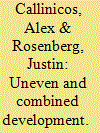

|
|
|
| 13 |
ID:
186290
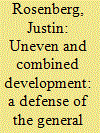

|
|
|
|
|
| Summary/Abstract |
This article responds to criticisms of the current revival of Uneven and Combined Development (UCD), particularly those aimed at the idea of a ‘general abstraction’ of UCD. Three main charges have been pressed: that UCD is not a real theory; that its transhistorical extension has reduced it to an unhistorical reification; and that its language of ‘advanced’ and ‘backward’ betrays its enduring Eurocentric foundations. The article argues not only that UCD can be defended, but also that it is the general abstraction which enables UCD to make its strongest contributions to solving problems of theoretical insufficiency, ahistoricism and Eurocentrism in social thought more generally. Finally the article ends by speculating on the reason why the much-maligned general abstraction of UCD should turn out to be of such significance.
|
|
|
|
|
|
|
|
|
|
|
|
|
|
|
|
| 14 |
ID:
073831
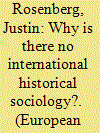

|
|
|
|
|
| Publication |
2006.
|
| Summary/Abstract |
Historical sociological studies in IR face a challenge similar to that discussed by Martin Wight in 'Why is There no International Theory?' Classical social theorists conceptualized 'society' in the ontological singular, leaving their successors with a 'domestic analogy' problem which has dogged attempts to provide a social theory of International Relations. Overcoming this problem requires an expansion of the premises of social theory to incorporate those general features of social reality which generate the phenomenon of 'the international'. This expansion can be achieved using Leon Trotsky's idea of 'uneven and combined development'. Specifically, the existence of 'the international' arises ultimately from the 'unevenness' of human sociohistorical existence; its distinctive characteristics can be derived from analysis of the resultant condition of 'combined development'; and its significance, thus sociologically redefined, entails a reconceptualization of 'development' itself - one which removes the source of the 'domestic analogy' problem for historical sociology.
|
|
|
|
|
|
|
|
|
|
|
|
|
|
|
|
|
|
|
|
|